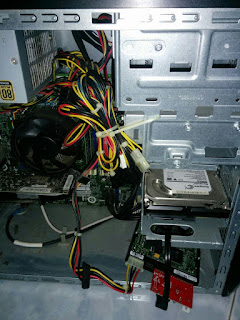(1) Raspberry Pi case & Kodi
(1a) Make shift case
Once day I went to school to watch Star Wars, and only brought my RPi with me. So I transported it in this case (originally a case for cards). Used tissue to keep it from moving around. Decided to get a proper case.
(1b) Perm case
I have decided that one of my Pis will seat permanently beside my monitor. This case will hold it. I will use it to watch movies and also host PiHole (an ad blocking tech that I recently learnt about, will post more when I implement it). I pasted the heat sinks (not necessary but for the "cool" factor), and it has a fan too.
(1c) Failed travel/holding case
This is a second case I bought, it was really cheap, just under $3. Was planning to use this for a travel case (to hold my second pi when moving around) but after I got it I realized you can only securely close it by using screws. Not suitable for the purpose I intended it for; will sell it off.
(1d) Kodi
Tried out all the players I wrote about in my previous post, I like Kodi the best. However I also like playing videos using the terminal command in Rasbian. Here I was powering the Pi using an external charger.
(2) SUMOBOT!
A friend who visited Silicon Valley got this for free and passed it to me. After I got it, I went to search Youtube and watch some videos about Sumbot competitions. Basically who of them are placed in a circle, and they are supposed to push the other out. How exciting! The board however is BASIC Stamp, which is coded in STAMP, which I don't really like (I find writing code for the Arduino a faster and more intuitive process).
And just my luck, a few days later I was walking by the school of EEE (Electrical and Electronic Engineering) , and saw a poster for a Sumbot competition! The registration deadline was over but I called the number and managed to weasel my way in (they needed a few people to top up one or two teams). Most people in the competition are from EEE or REP (Renaissance Engineering Programme). I'm the only one from Mech. Good news is that we will be using the Arduino Uno! It is supposed to be fully autonomous. What I was not expecting, however, was that we were supposed to build the whole bot ourselves (I was under the impression everyone would start off from the same base and do modifications. I could use the one my friend gave me, but in the spirit of fairness I shall build one as well. Sure this will take longer, but would probably be fun. Will dedicate a post to it after the competition ends.
(3) Google Cardboard
Finally bought it. Virtual Reality for those who virtually have no money (Copyright pending). Lol jk.
It was really fun to assemble.
Unfortunately this one did not come with the NFC tag to launch the app (I bought a really cheap one from China, as usual). I tried it on, and for some reason Google apps (the samples and Youtube) seems to not be in focus. However third party games are working perfectly. I would have to try and rectify this problem when I have the time, because I really wish to use this for Youtube videos as well. Games can keep you occupied for only so long.
(3) Misc
(3a) Repaired the washing Machine
So my washing machine was not working, it kept beeping after drawing water. I spent an hour fiddling at the back and searching online for solutions. Needless to say, the washing machine hackers community is pretty much non existent. However the few forums that did exist, were pretty helpful in informing me of common problems, which helped me narrow down the problem.
Finally I decided to open the control panel. The circuit board is protected from water using some very thick wax like substance. I realized there was a catch under the lid, which was empty. Realizing it was probably used to hold a sensor which indicated if the lid was open or closed, I went to Google again and realized it was a case of a missing <strike>sensor</strike> magnet. After unsuccessfully trying to find a strong magnet around the house, I asked my mom and she said she found one in the wash. It turned out to be the one which had fell off (not sure why I didn't think of where it went earlier, guess the excitement of finding a replacement got the better of me). I fixed it on the inside of the control panel this time, instead of under the lid, so now the machine can run without having the lid down (not a very useful feature, I admit, but at least the magnet won't be going anywhere anymore).
(3b) Purchases
Bought a 2.5" HD case, so now I won't have to switch around.
I didn't buy this, but it was a gift from the friend who visited Silicon Valley and got it from Facebook's gift shop. Facebook HQ. Who knows, maybe MZ had glanced at it before? Haha.
(3c) Autonomous Car
I have a project to do this semester, which should be about sensors and one of the themes given is future mobility. I have decided to expand upon my internship knowledge and build an almost fully autonomous car. And by car I mean I am going to use the chassis of a big but cheap RC car. Now this is a difficult project, so I hope I would be able to complete it in time. Will dedicate a post to it once I am done.

















































